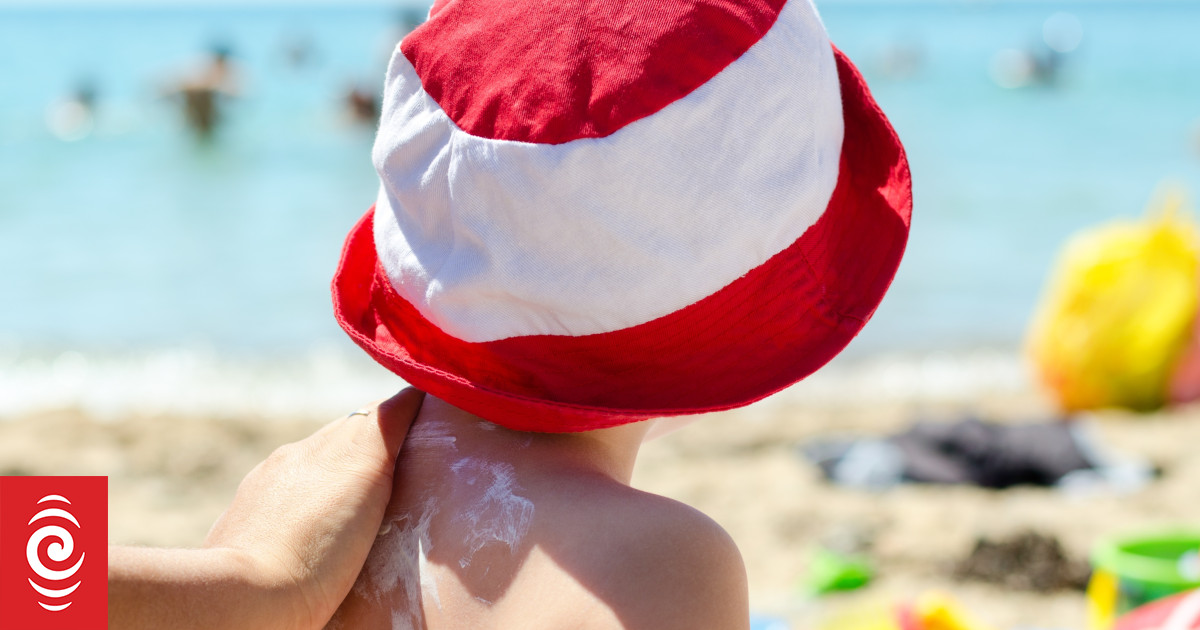At least five brands have put the sale of specific products on pause while they do independent testing – but at least some of those products are still available for purchase here.
Photo: ampak/123RF
Sunscreen law dictates how SPFs are labelled, but when a product doesn’t meet its claims, enforcement is a grey area.
The sun is just as harsh here as it is in Australia, and many of the sunscreen brands are the same.
But when some of them failed badly in consumer tests across the ditch, it did not lead to them being pulled from New Zealand shelves.
Australian consumer protection group Choice released findings of its sunscreen tests in June, and 16 of 20 products tested came back lower than their SPF labels.
But there was one standout: a zinc-based sunscreen called Ultra Violette Lean Screen SPF 50+ tested at just SPF 4.
Social media went wild, but the brand initially stood by its product, with the co-founder saying: “I also put Lean Screen on my children, and I still would tomorrow.”
But this was only the beginning of an unfolding drama that has called into question the protection offered by several products from several brands, not just in Australia but also on our shelves.
“We test what we can but it’s just the tip of the iceberg, so we definitely think there needs to be some monitoring [of] compliance done in New Zealand to just ensure that the sunscreens consumers are buying are what they’re getting, and that we don’t have any more of these sunscreens that are providing low protection when you think it’s very high,” says Consumer NZ’s Belinda Castles, who has worked on investigations into sunscreens for more than a decade.
New Zealand now has the Sunscreen (Product Safety Standard) Act, which Castles says is “a positive thing”.
“Back when Consumer started testing sunscreens, there was no regulation around sunscreens basically, so anyone could make a sunscreen and sell it online, and people did.
“We had a huge issue in New Zealand. Since that Sunscreen (Product Safety) Act came in, there is more protections for consumers – now products have to abide by the Act … which has requirements for independent testing and also labeling requirements as well.”
But when it comes to enforcement, things are not so positive.
“There’s probably very little enforcement.”
She says that to make a complaint with the Commerce Commission, an independent test needs to be done – but there are so many sunscreens sold here and tests cost upwards of $5000 per sunscreen.
After Ultra Violette did independent testing and got a series of inconsistent results, ranging from SPF 4 to 64, it recalled the product and offered customers a full refund (no other Ultra Violette products are affected).
But now it appears several other brands share the same base formula as Lean Screen, suggesting that they may be providing well under their claims. Castles says that some brands sometimes “will go to a contract sunscreen manufacturer so it’s possible that there’s different products on the market that are actually the same sunscreen, but they’re just repackaged and sold under a different brand”.
At least five brands have put the sale of specific products on pause while they do independent testing – but at least some of those products are still available for purchase here. (These products were not recalled, but rather voluntarily ‘paused’ by the brands selling them while they do independent testing.)
One of these brands is Aspect, which paused sale of its Sun Physical Sun Protection SPF50+ and Sun Tinted Physical SPF50+.
But The Detail found multiple sites where these were still available for purchase, including at an upmarket medical clinic in Auckland. Aspect told The Detail that it sent communication to its stockists telling them that Aspect is “taking a proactive step to pause sales”.
But in that message, it also says that “while we have temporarily paused the sale of the above two SPF products, it is your choice whether you wish to continue selling your current stock” and that it is not currently offering refunds.
Castles says that if the brands are concerned that their product is not meeting the SPF claim and “if it is the same formula as the Ultra Violette Lean Screen that’s been in question, then consumers should totally be able to return that product and get a refund”.
Another product, Naked Sundays’ SPF50+ Collagen Glow Mineral Sunscreen was sold at Mecca. The product has been pulled, and there’s a statement on the brand’s page on the Mecca site. Mecca says it has also emailed customers in its database who had recently bought the sunscreen.
As for Lean Screen, New Zealanders can buy the brand directly through the website or through Sephora. The brand sent an email directly to customers and has a statement on its site. We asked Sephora if it had emailed customers who purchased through Sephora, but it declined to respond.
Meanwhile, of the 16 products tested by Choice that failed to meet their SPF claims, at least five are still available to buy here.
In Wednesday’s episode of The Detail, Castles explains the laws around sunscreen and where enforcement falls short, and what consumers can do to ensure they’re getting good protection from their sunscreens.
Check out how to listen to and follow The Detail here.
You can also stay up-to-date by liking us on Facebook or following us on Twitter.

